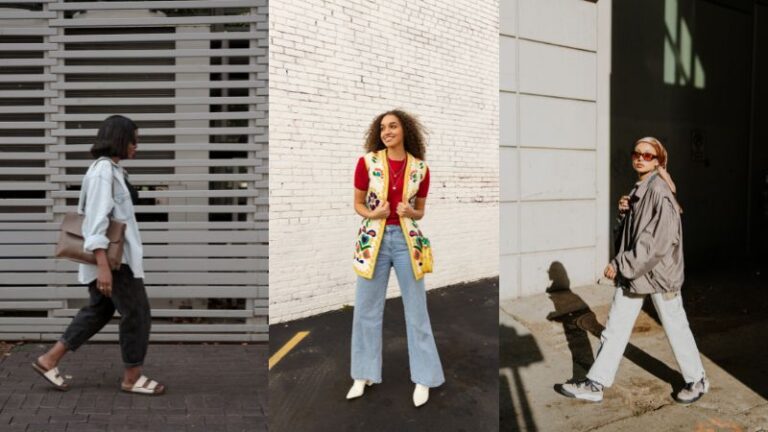Fashion is an ever-evolving industry that touches the lives of people worldwide. In recent years, ethical and sustainable fashion practices have gained significant prominence, transforming the way we view and interact with clothing. This introduction sets the stage for our exploration of sustainability and ethical practices in fashion culture, highlighting their definitions, importance, and purpose.

Definition of Ethical and Sustainable Fashion
Ethical fashion refers to clothing and accessories that are produced with a focus on social responsibility and ethical considerations. This includes ethical sourcing of materials, fair labor practices, and transparency in the supply chain. It aims to protect the rights and well-being of workers and minimize harm to communities.
Sustainable fashion, on the other hand, revolves around reducing the environmental impact of the fashion industry. It encompasses practices that minimize resource consumption, promote recycling and circular fashion, and ensure the longevity of products.
The Significance of Sustainability in the Fashion Industry
The fashion industry is one of the largest and most influential sectors globally. However, its growth has come at a substantial cost to the environment, with issues like excessive waste, pollution, and resource depletion. Sustainability in the fashion industry is crucial as it addresses these pressing environmental concerns, aiming to mitigate the industry’s adverse effects on the planet.
The importance of ethical fashion
Ethical fashion is vital because it places people at the forefront of the industry. It ensures that workers throughout the supply chain are treated fairly, paid decent wages, and provided safe working conditions. Ethical fashion also promotes inclusivity and diversity, making the industry more equitable and just.
Purpose of the Outline
The purpose of this outline is to provide a structured framework for exploring sustainability and ethical practices in the fashion industry. By delving into the definitions, significance, and distinctions between ethical and sustainable fashion, we aim to shed light on how these principles are reshaping the fashion culture and fostering a more responsible and conscious approach to clothing.
Sustainability in the Fashion Industry
Overview of Sustainability in the Fashion Industry
Sustainability has emerged as a critical concept within the fashion industry, prompting a fundamental shift in how fashion brands and consumers approach clothing. It encompasses a holistic approach that considers the environmental, social, and economic impacts of the fashion supply chain. Sustainability initiatives in fashion aim to address issues such as resource depletion, pollution, and unfair labor practices, with the ultimate goal of reducing the industry’s negative footprint on the planet.
Environmental Impact of the Fashion Industry
The fashion industry is responsible for significant environmental degradation. It is one of the largest contributors to water pollution and is known for its heavy reliance on resource-intensive processes like dyeing and finishing. Statistics from PDF reports show alarming figures related to water usage, greenhouse gas emissions, and chemical pollution caused by fashion production.

Consumption patterns and waste
The fast fashion model, characterized by rapid production cycles and low-quality, disposable clothing, has led to an alarming increase in textile waste. PDF data reveals that the average consumer now buys 60% more clothing items than they did 20 years ago, and nearly 85% of textiles end up in landfills. This has prompted a growing awareness of the need for more sustainable consumption habits and responsible disposal.
Key Players and Initiatives Driving Sustainability in Fashion
While the fashion industry faces significant sustainability challenges, numerous brands, organizations, and initiatives are working tirelessly to bring about positive change. Sustainable fashion is no longer a niche concept but has gained mainstream recognition. PDF reports highlight these key players and initiatives that are implementing sustainable practices, from using eco-friendly materials to promoting circular fashion and reducing waste. Collaboration between industry leaders and advocacy groups has been instrumental in driving sustainability forward.
Why Ethical Fashion Matters
Social and Human Rights Issues in the Fashion Industry
Ethical fashion matters because it confronts the social and human rights issues that have plagued the fashion industry for decades. Reports and investigations have shed light on issues like child labor, unsafe working conditions, and unfair wages in garment factories worldwide. The fashion industry’s commitment to ethical practices is essential to combating these injustices.
Workers in the Fashion Supply Chain
The industry’s practices have an impact on everyone involved in the fashion supply chain, from cotton farmers to garment factory workers. Ethical fashion ensures that these workers are treated with dignity and respect, receive fair wages, and have safe working conditions. This not only improves their quality of life but also fosters a more equitable global economy.
Consumer demand for ethical products
As consumers become more informed and conscious of their purchasing choices, there is a growing demand for ethically produced clothing. PDF data often reflects this trend, showing that consumers are willing to pay a premium for products that align with their values. Brands that prioritize ethical fashion are more likely to attract and retain socially responsible consumers.
Brands and Organizations Leading by Example
Several brands and organizations are setting the standard for ethical fashion practices. They serve as role models by implementing transparent supply chains, ensuring fair labor practices, and reducing their environmental impact. PDF reports frequently showcase these pioneers, highlighting their efforts to inspire industry-wide change and demonstrate that ethical fashion is not only possible but also profitable and sustainable in the long run.
Ethical Considerations Focus on Labor and Human Rights
Ethical fashion primarily concerns itself with the treatment of individuals involved in the fashion supply chain. This includes garment workers, artisans, and laborers. Ethical practices encompass fair wages, safe working conditions, and adherence to international labor standards. Brands committed to ethical fashion prioritize the well-being and rights of workers, often auditing and transparently reporting on their supply chain practices.
Sustainable Fashion Centers on Environmental Impact
Sustainable fashion, on the other hand, is centered on reducing the industry’s environmental footprint. It addresses concerns like excessive resource consumption, pollution, and waste. Sustainable fashion brands strive to minimize the use of non-renewable resources, promote eco-friendly materials, and employ practices that reduce energy consumption and carbon emissions. Circular fashion, which encourages recycling and reusing garments, is a key aspect of sustainability.
Examples of Brands that Emphasize One or Both Aspects
Many brands recognize the importance of both ethical and sustainable fashion, but some focus more prominently on one aspect than the other:
- Patagonia: Patagonia is renowned for its strong commitment to sustainability. They use recycled materials and promote the repair and reuse of their products. They also contribute a portion of their profits to environmental causes. While they follow ethical labor practices, their sustainability efforts are especially prominent.
- Eileen Fisher: Eileen Fisher is a prime example of a brand that emphasizes both ethical and sustainable fashion. They prioritize fair wages for workers and transparency in their supply chain. Simultaneously, they have implemented sustainable practices, using organic materials and investing in closed-loop systems for their clothing.
- Everlane: Everlane is known for its transparent pricing and commitment to ethical practices. They provide consumers with information about the true cost of their products and their factories. Although their primary focus is ethics, they also strive to use sustainable materials and reduce waste in production.

Sustainability in Fashion and Textiles
Sustainable Materials in Fashion-Eco-Friendly Fabrics (e.g., Organic Cotton, Tencel, Recycled Polyester)
Sustainable fashion starts with the materials used. Brands are increasingly turning to eco-friendly fabrics like organic cotton, which is grown without harmful pesticides, and Tencel, which is made from sustainably sourced wood pulp. Recycled polyester reduces the need for virgin materials and lessens the environmental impact of clothing production.
Innovations in Sustainable Textiles
Innovations in textile technology have led to the development of new sustainable materials. For example, mushroom leather (mycelium) and lab-grown fabrics are emerging as alternatives to traditional leather and synthetic textiles. These innovations aim to reduce the environmental footprint of fashion materials.
Manufacturing Processes that Promote Sustainability
Reduced water usage
The fashion industry is notorious for its water-intensive processes, such as dyeing and finishing. Sustainable practices involve the adoption of dyeing techniques that require less water or the recycling of water within the manufacturing process. Brands are also exploring waterless dyeing methods to conserve this precious resource.
Low-impact dyeing techniques
Low-impact dyes produce vibrant colors with significantly reduced environmental harm compared to traditional dyes. Brands that prioritize sustainability often opt for low-impact dyeing techniques to minimize chemical pollution in waterways and reduce energy consumption.
Energy-efficient Production
Sustainable fashion manufacturing also entails energy-efficient practices. This includes using renewable energy sources, optimizing production processes, and reducing greenhouse gas emissions associated with clothing production. Energy efficiency not only reduces environmental impact but also lowers operational costs for brands committed to sustainability.
Ethical Challenges in Fashion
Exploitation of Labor
One of the most pressing ethical challenges in the fashion industry is the exploitation of labor. Garment workers, often in low-income countries, face harsh working conditions, low wages, and a lack of job security. Ethical concerns revolve around the need to ensure fair treatment, safe workplaces, and decent living wages for these workers.
Cultural Appropriation
In the fashion industry, cultural appropriation refers to the borrowing or appropriating of elements from one culture by another without proper acknowledgment or understanding. This practice can be offensive and disrespectful. Brands must navigate cultural influences with care and cultural sensitivity, avoiding harm to the communities from which they draw inspiration.
Intellectual property issues
Intellectual property theft is another ethical challenge in the industry. Copying designs, trademark infringements, and counterfeiting are rampant problems. These practices not only harm designers and creators but also dilute the authenticity and value of fashion brands.
More Post : The Influence Of Street Style On Fashion Cultures

Strategies to Address Ethical Concerns
Fair trade certifications
Fair trade certifications, such as Fair Trade USA or the Fair Wear Foundation, help ensure that workers in the fashion supply chain are treated ethically. Brands that obtain these certifications commit to paying fair wages, adhering to labor standards, and promoting transparency. Consumers can look for these certifications when making purchasing decisions to support ethical fashion brands.
Ethical Auditing and Accountability
Brands can take the initiative to conduct ethical audits of their supply chains. These audits assess working conditions, wages, and adherence to ethical standards. Regular monitoring and transparency in reporting audit results help identify and rectify ethical concerns in a timely manner.
Ethical Fashion Codes of Conduct
Developing and adhering to codes of conduct is a proactive approach to address ethical issues in the fashion industry. These codes outline the brand’s commitment to ethical practices, labor rights, and environmental responsibility. By making their codes of conduct public, brands demonstrate their dedication to ethical principles and invite accountability from consumers and stakeholders.
Ethical Textiles-Defining Ethical Textiles
Ethical textiles refer to materials and fabrics produced using sustainable and socially responsible practices. These textiles prioritize environmental sustainability, worker welfare, and safe production processes.
Sustainable and Ethical Practices in Textile Production
Organic Farming and Agriculture
Ethical textiles often begin with the cultivation of raw materials like cotton. Organic farming practices eliminate the use of harmful pesticides and synthetic chemicals, promoting soil health and reducing harm to agricultural workers and ecosystems.
Eliminating Harmful Chemicals
The textile industry traditionally relies on chemicals in dyeing and finishing processes. Ethical textile production aims to eliminate or reduce the use of harmful chemicals. It includes the adoption of eco-friendly dyes, reduced water and energy consumption, and responsible chemical management.
Worker Welfare in Textile Production
Ethical textiles prioritize the well-being of workers involved in the textile production process. This includes ensuring safe working conditions, providing fair wages, and respecting labor rights. Brands committed to ethical textiles often engage with suppliers to enforce these ethical standards, creating a more humane and sustainable textile industry.
Ethical Fashion Manufacturing
Ethical fashion manufacturing represents the commitment to producing clothing and accessories while prioritizing the welfare of workers, environmental sustainability, and responsible sourcing. It involves a holistic approach that considers the entire production process, from raw materials to the final product, in an ethical and sustainable manner.
Factors to Consider in Ethical Manufacturing
Labor Conditions and Wages
Ethical fashion manufacturing begins with ensuring that labor conditions are safe and humane. Workers should be paid fair wages, provided with proper working conditions, and given the right to organize and bargain collectively. Brands must prioritize the well-being and rights of their employees throughout the supply chain.
Sustainable Production Practices
Sustainable production practices are essential in reducing the environmental impact of fashion manufacturing. This includes using eco-friendly production techniques, minimizing waste, and conserving resources like water and energy. Sustainable manufacturing aims to decrease the carbon footprint of the fashion industry.
Local and Ethical Sourcing
Ethical manufacturing also involves sourcing materials responsibly. This includes using locally sourced materials to support local economies and reduce transportation emissions. Additionally, brands should prioritize ethical sourcing practices, ensuring that materials are obtained without harming ecosystems or communities.
Case Studies of Ethical Fashion Manufacturing Processes
To illustrate the principles of ethical fashion manufacturing, we can examine real-world case studies of brands that have successfully integrated ethical practices into their manufacturing processes. These examples can highlight the positive impact of ethical manufacturing on both the fashion industry and the broader community.
Conclusion
In today’s fashion culture, sustainability and ethics have emerged as non-negotiable values. Sustainable practices reduce the industry’s environmental impact, while ethical considerations ensure that human rights and fair labor practices are upheld. Together, they reshape the fashion industry towards a more responsible and conscientious future.
The fashion industry is undergoing a transformative shift as it embraces sustainability and ethics. This evolution is driven by consumer demand, industry leaders, and the recognition that business as usual is no longer tenable. The fashion industry is increasingly recognizing that sustainable and ethical practices are not just trends but fundamental to its long-term viability.
Encouraging Consumer Awareness and Responsible Choices
Consumer awareness plays a pivotal role in advancing sustainability and ethics in fashion. Educated consumers can make informed choices that support ethical and sustainable brands. Brands and organizations should continue to educate consumers about the impact of their choices and empower them to make responsible decisions.
As we conclude, we extend a call to action to all stakeholders in the fashion industry. Brands, manufacturers, consumers, and policymakers must work together to create a fashion culture that values people and the planet. By embracing sustainability and ethics, we can ensure a more equitable and sustainable future for the fashion industry and the world at large.






